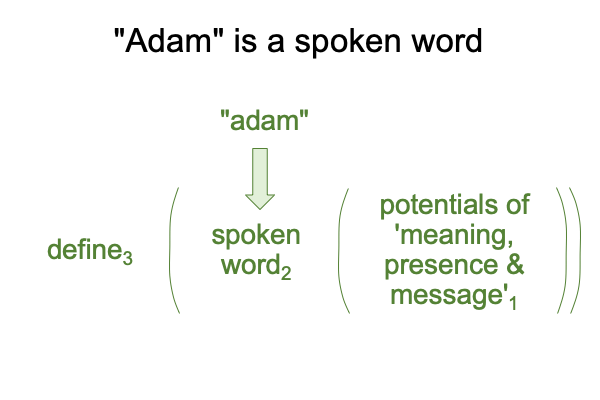0056 What is proposition six?
In the early chapters of Genesis, the word, “adam”, is used in a variety of ways.
In some cases, “adam” refers to human beings as a specific kind (or “species”).
In other cases, “adam” refers to the male of our species.
In other cases, “adam” serves as a personal name.
0057 Eggheads sort these cases out, based on clues, such as the presence or absence of a definitive article or an attached proposition.
0058 Why focus on this one word?
In speech-alone talk, we project meaning, presence and message into purely symbolic spoken words. For “adam”, the projection is spectral. There is a spectrum of meanings. The effect is spooky. “Adam” is everyone. “Adam” is a representative. “Adam” is a person.
0059 What does this suggest?
Plain-speaking interpretations get scrambled when the story-teller speaks both esoterically and plainly.
0060 Meanwhile, scientific investigations of word-use breaks the term, “adam”, into six classes: generic, archetypal, representational, personal, anomalous and proposition-attached.
Can we model “adam” based on these classifications?
0061 How do we define the word, “adam”?
Well, I can follow the masterwork, How To Define the Word “Religion”. “Adam” is an actuality, a spoken word, that is supported by three potentials.
Here is a picture.

0062 One problem with plain-speaking interpretations of Genesis 1-11 becomes more clear when I suggest, as Walton does in proposition nine, that the full potentials of the words are revealed by Saint Paul, thousands of years after the stories of the Primeval History are first told.
The latency of potential of the word, “adam”, is remarkable.
0063 N.T. Wright brings up latency in his contribution in proposition nineteen. The early chapters of Genesis are not mentioned in the Old Testament. On top of that, when Adam is discussed in postbiblical Second Temple texts, the subject is a matter of debate and conjecture.
Why is this the case?
One guess can be found in Looking at Mark Smith’s Book (2019) “The Genesis of Good and Evil”, appearing in January 2022, in the blog at www.raziemah.com.
